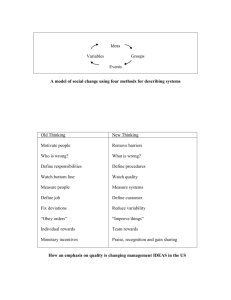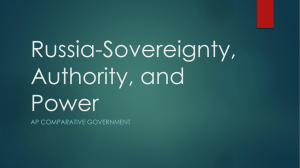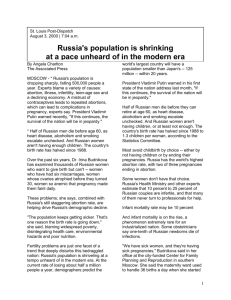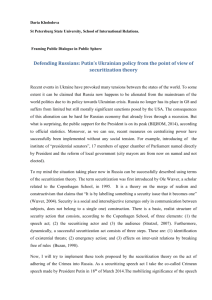U.S.-Russia Relations: President Putin: The First Ninety Days
advertisement
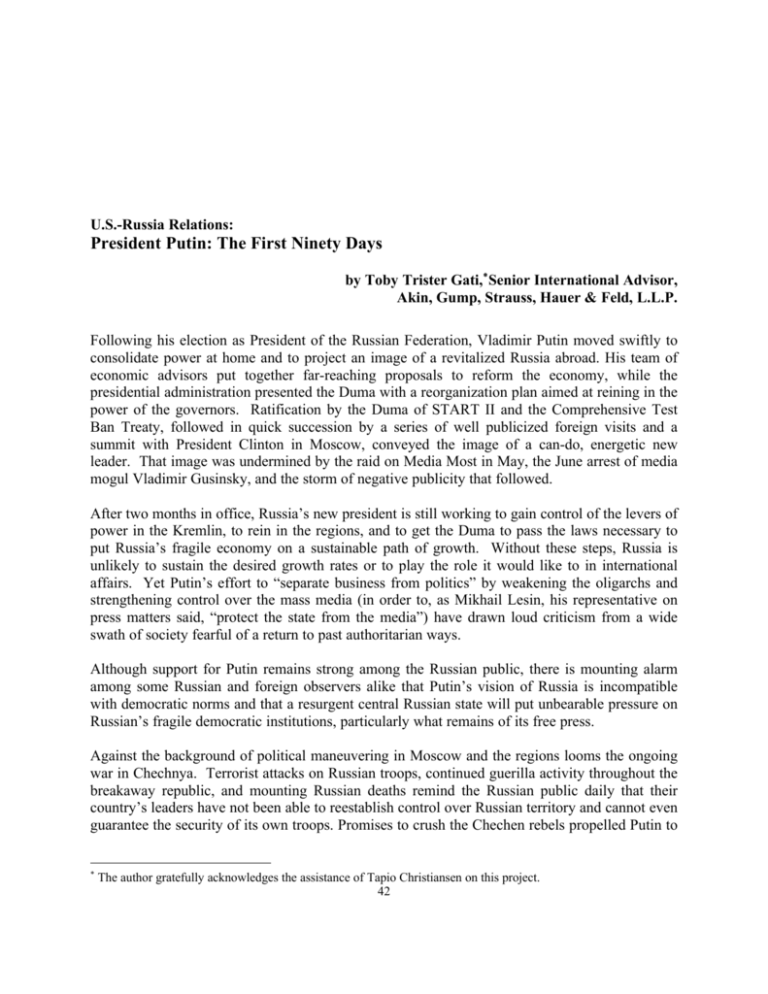
U.S.-Russia Relations: President Putin: The First Ninety Days by Toby Trister Gati,∗ Senior International Advisor, Akin, Gump, Strauss, Hauer & Feld, L.L.P. Following his election as President of the Russian Federation, Vladimir Putin moved swiftly to consolidate power at home and to project an image of a revitalized Russia abroad. His team of economic advisors put together far-reaching proposals to reform the economy, while the presidential administration presented the Duma with a reorganization plan aimed at reining in the power of the governors. Ratification by the Duma of START II and the Comprehensive Test Ban Treaty, followed in quick succession by a series of well publicized foreign visits and a summit with President Clinton in Moscow, conveyed the image of a can-do, energetic new leader. That image was undermined by the raid on Media Most in May, the June arrest of media mogul Vladimir Gusinsky, and the storm of negative publicity that followed. After two months in office, Russia’s new president is still working to gain control of the levers of power in the Kremlin, to rein in the regions, and to get the Duma to pass the laws necessary to put Russia’s fragile economy on a sustainable path of growth. Without these steps, Russia is unlikely to sustain the desired growth rates or to play the role it would like to in international affairs. Yet Putin’s effort to “separate business from politics” by weakening the oligarchs and strengthening control over the mass media (in order to, as Mikhail Lesin, his representative on press matters said, “protect the state from the media”) have drawn loud criticism from a wide swath of society fearful of a return to past authoritarian ways. Although support for Putin remains strong among the Russian public, there is mounting alarm among some Russian and foreign observers alike that Putin’s vision of Russia is incompatible with democratic norms and that a resurgent central Russian state will put unbearable pressure on Russian’s fragile democratic institutions, particularly what remains of its free press. Against the background of political maneuvering in Moscow and the regions looms the ongoing war in Chechnya. Terrorist attacks on Russian troops, continued guerilla activity throughout the breakaway republic, and mounting Russian deaths remind the Russian public daily that their country’s leaders have not been able to reestablish control over Russian territory and cannot even guarantee the security of its own troops. Promises to crush the Chechen rebels propelled Putin to ∗ The author gratefully acknowledges the assistance of Tapio Christiansen on this project. 42 power; he must be acutely aware that disillusionment with the course of the war could over time turn the Russian public against him. Ratification of START II and the Comprehensive Test Ban Treaty Just weeks after his election, President Putin took advantage of his decisive win to achieve what his predecessor had promised so often and failed to accomplish--Duma ratification of the U.S.Russian START II treaty limiting offensive nuclear weapons and the multilateral Comprehensive Test Ban Treaty (CTBT). Putin’s ability to get the votes of long-time opponents of the treaty underscored the desire of both the Russian executive and legislative branch to forge a more cooperative relationship, as well as Moscow’s intention of playing a more active international role in future arms control policy debates affecting Russia’s vital interests. It also signaled to U.S. policymakers that the discord and disarray characteristic of the Yeltsin era--when promises made were only occasionally kept--was over. Choosing to ignore the evident one-upmanship behind the maneuver (President Clinton had suffered a stinging defeat when the U.S. Senate failed to ratify the CTBT treaty and implementation of the START II treaty is stalled barring Senate ratification of two protocols agreed upon by the U.S. and Russia), Washington publicly hailed the ratification as a positive step. Hopes were raised that there might now be real progress toward resolving the thorniest issue on the arms control agenda--the future of the 1972 Anti-Ballistic Missile (ABM) treaty and the U.S. desire to deploy a limited national missile defense (NMD) system. U.S.-Russian Summitry and National Missile Defense In late April, President Clinton announced he would visit Moscow as part of his farewell European tour. The announcement came amid renewed investor interest in the Russian economy and initial optimism regarding President Putin’s plans for the country. The Clinton administration clearly viewed the June summit as an opportunity to begin a dialogue with the new Russian president, to put aside some of the rancor of the past few years, and to encourage the Russians to adopt policies which would jumpstart Western investment in the Russian economy and facilitate Russia’s democratic transition. President Putin saw the summit as an opportunity to highlight the new ways of doing things in Moscow and to underscore the Russian desire for cooperation with the West, but on more equal terms. Gone were the familiar Boris-Bill embraces. Gone too were the concerns that the Russian president might not have the stamina to make it through the meeting. The initial focus of the summit was to find a compromise on NMD acceptable to both sides. It was hoped that this would clear the way for negotiations on a START III agreement and, on the U.S. side, take the heat off the Clinton administration to back the more robust plan for national missile defense put forward by the Republicans. Clinton’s room for maneuver was severely constrained, however, when the Chairman of the Senate Foreign Relations Committee, Jesse 43 Helms, let it be known that any agreement reached in Moscow on NMD would be “dead on arrival” in Congress. Russian opposition to the program also became more vocal, with Russian political and military leaders focusing on the threat the system posed to Russia’s retaliatory capabilities and predicting dire consequences for the entire strategic arms control regime so laboriously agreed upon during the past 30 years. Clinton used the summit to explain the U.S. position to Putin in great detail, and both leaders agreed on a sixteen point statement of principles to guide the negotiations on strategic arms. In the statement, Moscow agreed to examine the nature of the threat posed by missile proliferation, but it accepted neither the assessment of the threat posed by North Korea (and others) nor the proposed American solution to the problem. Russia insisted that the elimination of any presumed threat focus first on political, economic, and diplomatic instruments of policy. Only then might some sort of cooperative U.S.-European-Russian system be developed. Immediately after the summit, Moscow put forward a proposal of its own, to develop precisely this type of cooperative program with the Europeans--a proposal Washington viewed as politically mischievous and strategically flawed. The Russians were thus able to play on the growing fears of America’s European allies that the planned missile defense program would be destabilizing and leave them vulnerable to missile attack. Javier Solana, the European Union’s foreign policy chief, noted European concerns that the proposed U.S. cure might be “worse than the threat” if, by going ahead with NMD, the U.S. were to spur Russia or China to bolster their own nuclear arsenals or take as yet unspecified defensive countermeasures. German Foreign Minister Joschka Fischer summed up these European concerns, noting, “for us, it’s a very key element whether this will lead to a confrontation between the United States and Russia.” As each side continued to float proposals and counterproposals, to make statements, and to seek political support for its position, it became clear that the critical decisions on what kind of system might be built will await a new administration in Washington. The possibility for a breakthrough on the issue of ballistic missile defense in the next few months is minimal. The hard bargaining over a compromise solution, if there is to be one, will be conducted by the new U.S. president after January 2001. Instead, the summit produced several important, but not headline making, agreements: to establish a permanent joint early-warning center in Moscow to prevent miscalculations about missile launches and to reduce stockpiles of military-grade plutonium by 34 tons each. Media Most Under Attack On May 11, armed men wearing camouflage garb and black ski masks raided the offices of Russian media magnate Vladimir Gusinsky. Initially, Moscow said the raid was aimed at curtailing the activities of Gusinsky’s private security service. However, after conflicting explanations emerged about who carried out the raids and why, executives at Media Most, the holding company for Gusinsky’s media empire, charged that the raid was retaliation for their 44 lack of support during the presidential race and for critical reporting about the government and the war in Chechnya by NTV and the newspaper Sevodnya, each a part of the Media Most group. Igor Malashenko, second to Gusinsky at Media Most, claimed that the raid was “vengeance, punishment for already published materials and…an act of intimidation.” It had been clear for some time that the presidential administration, in particular Alexander Voloshin, Yeltsin’s and now Putin’s Chief of Staff, had been trying to exert control over NTV--the only important independent media outlet in Russia and one that has traditionally been critical of the Kremlin. Amid claims that Media Most had engaged in some corrupt business dealings was the clear intention that, by intimidating Gusinsky, the rest of the Russia media (and the oligarchs that own them) would toe the line. The importance of a free press was underscored when NTV coverage of the first Chechen campaign was a major factor in turning public sentiment against that war, and later, in the l996 presidential election, when the major media outlets owned by the oligarchs banded together to ensure the reelection of President Yeltsin. There have been numerous other examples where the media has been used to pursue political goals and smear one’s opponents. The hypersensitivity to critical coverage extends not only to news shows, but even to comedy and satire. Gusinsky’s network runs a hugely popular weekly program, “Kukli,” in which leading politicians and national figures are represented as puppets. The show satirizes current events and caricaturizes national leaders. The Putin puppet, often presenting the president in a most unflattering light, was no exception. After a particularly nasty episode, in which Putin was shown in search of some prostitutes (all of whom resembled Russia’s other leading political figures), the administration let it be known that NTV would be well advised to remove the Putin puppet from its program. On May 29, NTV anchorman Yevgeny Kiselev announced that NTV had indeed reached an agreement with the Kremlin to withdraw the puppet from the program. Kiselev went on to say that, according to the agreement, the “authorities would now leave NTV and Media Most in peace.” Perhaps the fact that Putin was not “shown” on the next program, but was instead represented as the voice of God, contributed to the breakdown of this gentlemen’s agreement and the events that culminated in the arrest of Vladimir Gusinsky on June 13 on suspicion of fraud in connection with his business dealings. In any case, the international outcry over the raid was immediate and intense. Even Boris Berezovsky, an oligarch close to the Kremlin with large media holdings of his own, chided Putin in the press, warning of the danger of dictatorship. President Clinton used the summit in Moscow to show his support for Media Most, appearing on a radio call-in program on EkhoMoskvy, a station owned by Media Most. Supporters of Putin have claimed that the raid was authorized by those in the government that may want to undermine or weaken the President’s authority. Whatever the real reasons, the arrest of Gusinsky, the efforts by Putin to deny responsibility or knowledge for the specific actions taken by his Prosecutor General, and the continued intimidation of Media Most personnel leave little doubt that President Putin’s vision of a stronger Russia does not include much room 45 for dissent or criticism. One of the first casualties of the tougher Russian policy was the postponement of a high-level U.S. business delegation scheduled to meet with President Putin to discuss ways to encourage renewed Western investment in Russia, announced by President Clinton at the June summit. After three nights in Butyrka prison, one of Russia’s worst, Gusinsky’s lawyers were able to obtain his release, although he is not allowed to leave Moscow and still faces charges of fraud. This highly visible campaign of intimidation and the subsequent opening of an investigation of the privatization of Norilsk Nickel, has sent shockwaves through the Russian body politic and given foreign investors the jitters. A letter signed by most of Russia’s leading businessmen expressing support for Gusinsky began with these words: “Until yesterday, we used to think we live in a democratic country. Today, we started to doubt it seriously. A precedent was established that appears to be the execution of a political opponent by the authorities, and all of us could be listed as opponents--practically the whole business community.” Internal Restructuring President Putin has initiated the most far-reaching changes to Russia’s governmental structure since the fall of the Soviet Union. He has appointed seven regional representatives with authority to oversee specific regional zones. This is the first step in creating what Putin refers to as a “working vertical structure of power” In addition, under a bill now working its way through the Duma, the President would have the right to sack local governors and mayors and dismiss regional parliaments on the basis of a court decision. Putin clearly intends to rein in those local authorities that have defied Moscow’s authority and put the others on notice that directives from the Kremlin can not be ignored in the future. However, having jumped at former President Yeltsin’s earlier suggestion that local officials take all the power they want from the center, Russia’s 89 regional leaders are not going to give up their autonomy without a struggle. The governors, who now automatically sit in the Federation Council (the upper house of the Parliament), have vowed to veto any legislation that would strip them of their powers in either the national or local arenas. Although the Duma has the votes to override any upper house veto, given Russia’s huge size, there are many means available to local rulers and the elites that support them to oppose commands from the center. For that reason, President Putin is likely to try to put together a compromise package which will impose a more uniform application of national laws and norms and reassert both political and financial controls from the center, while at the same time leaving the governors much latitude on issues of local concern. Putin’s Journeys While Yeltsin made Russia’s relationship with the United States a priority, Putin has made it clear that good bilateral ties are to be only one element of Russian foreign policy. Under no illusions about Russia’s weakness, Russia will not seek confrontation with the U.S., but it will not go the extra mile to take into account American sensibilities. Instead, Russia will seek to 46 build coalitions of regional powers--in Asia with China, in Europe with Germany and Great Britain--in support of Russian economic interests and shared foreign policy goals. High on the list of priorities is countering U.S. plans to build a limited national missile defense shield. Since taking office, President Putin has also reaffirmed relationship with countries actively opposing U.S. interests. He continues an active economic and political relationship with Iran and recently extended a large loan to Yugoslav President Slobodan Milosevic. He has dispatched delegations to Iraq and expressed Russia’s support for the lifting of UN sanctions against Baghdad. It is in the countries of the former Soviet Union that the changed focus of Russian foreign policy may become most pronounced. At a recent meeting of Commonwealth of Independent States (CIS) leaders, Russia made clear that it would not ignore events in its backyard, especially when geopolitics and oil come together, as they do in the Caspian basin. When the Kremlin published its new foreign policy doctrine, a main point was the need to defend Russian economic interests abroad and to address the plight of ethnic Russian in all parts of the post-Soviet space, in particular in the Baltic. Russia, like China and other regional powers, is increasingly frustrated by a unipolar world in which U.S. interests dominate. Seeking to advance Russia’s interests while limiting the U.S. ability to project its influence worldwide portends a more activist Russia on the world stage--one that is not afraid to step on U.S. toes. Putin will undoubtedly be doing much more traveling in order to achieve his broader objectives. Chechnya In recent weeks, the Chechens have stepped up their campaign of hit-and-run attacks and devastating suicide bombings. Russian casualties are again on the rise as is the sense that, despite government claims, the end of the war is nowhere in sight. Yet, on the international front, the vocal condemnation of Chechnya by Western governments of Russian behavior has abated. The European Council decided not to sanction Moscow and few in Washington are calling for reduced contacts because of Russian behavior. The real cost to Russia is less tangible but perhaps more long term: a lingering sense of shock in the West over how the war is being conducted and a growing unease in Moscow that the war which brought Putin to power could, at some point, be his undoing. A New Economic Reform Plan President Putin has spent much rhetoric on the need for Russia to overhaul its economy. Leading up to his election and during the past three months, a Putin team, led by German Gref, has been busy drawing up an ambitious eighteen month agenda to reform the Russian economy. At its heart lie generally liberal economic principles, such as reducing the public sector share in the economy with tight fiscal discipline; reforming state agencies to make it easier for businesses to start and function; modernizing the banking system; simplifying the tax code; and increasing 47 competition among the big natural gas, railway, and electricity monopolies. Although the plan has been adopted by the Putin cabinet, there is still a great deal of doubt over the government’s ability to implement the scheme, let alone its feasibility. However, unlike the economic plans of the past ten years, which were mainly drawn up in order to satisfy the International Monetary Fund and the World Bank, this latest plan was developed indigenously with little Western interference. Gref’s plan seems to be directed at the heart of Russia’s economic difficulties, and could be a positive indication of where the Russian economy is headed. However, politics, as it always does in Russia, still carries the upper hand and could interfere with any grand plans aimed at fundamental Russian reforms. Regardless, for President Putin, it would seem that the best of both worlds include a liberal economy combined with an authoritarian state. Corruption While President Putin is seeking to jumpstart a new, different round of economic reform, reports of scandals involving high level officials in the Yeltsin government serve as a sticky reminder that the old ways of doing business have not gone away. In June, Swiss authorities said they planned to charge several Russians with money laundering in connection with the Mabetex bribery allegation. Although the Swiss have yet to issue a full report, there is speculation that former Prime Minister Viktor Chernomyrdin and Yeltsin’s daughter, Tatyana Dyachenko, are also targets of these ongoing investigations. More damaging to the Putin presidency is the fact that corruption remains an integral part of economic and political life in Russia and that few high level officials have been punished for misuse of state funds. Calls for renewing the fight against corruption are still not taken seriously, with the result that political influence, rather than business ability, remains the key to economic success. Unless a clear signal emerges from the top, it will be difficult to implement any kind of clean up or change in the way business is done. Conclusion President Putin may be attempting to do the impossible--develop a 21st century economy while imposing a system of controls more suited to a 20th century authoritarian state. In time, one model or the other will win out. Those who still hope that Russia is committed to opening itself up to the global economy and allowing for the development of a more pluralistic state structure have to square how Putin has used the organs of state power since becoming president, and where the talent and incentives will come from to run a complex economy. Russian history always gives an edge to those who are willing to use power to silence opponents, whether in the media or the political realm. If past experience is any guide to the future, then the features of the system the new Kremlin rulers are creating are quite worrisome. The past quarter has witnessed efforts to strengthen the role of the state security and power ministries and to use the legal system as an instrument of intimidation. The West had hoped a new Russian president 48 would commit himself to transparency in government, stronger democratic institutions, and a more vibrant civil society. Time is running out if Putin wants to convince the skeptics that there is still a chance for the triumph of hope over experience. Chronology of U.S.-Russia Relations April – June 2000 Apr. 1, 2000: Putin states that the West has misinterpreted his previous statements about building a strong state in Russia to mean that an increasing role will be played by law enforcement agencies and security services. Instead, he said, he means “an effective state capable of guaranteeing the rules of the game translated into laws for everyone.” Apr. 5, 2000: Russian Federal Security Service (FSB) detains a U.S. citizen on charges of espionage. Apr. 7, 2000: A U.S. Navy ship belonging to the Multinational Interception Force (MIF) in the Persian Gulf halts the Russian oil tanker “Akademik Pustovoit.” Apr. 14, 2000: The Russian State Duma ratifies the START II treaty. Apr. 18, 2000: While in Britain, Putin appears to offer an opening for compromise on the ABM issue, commenting that, while “our legislation strictly links” maintenance of the ABM treaty with START II, “we have drawn a line between strategic and non-strategic defense. In this context, we are ready to conduct a dialogue.” Apr. 21, 2000: State Duma deputies approve the Comprehensive Test Ban Treaty. Apr. 23, 2000: Fifty Chechen fighters attack a Russian convoy near the southern village of Serzhen-Yurt, killing 13 Russians and wounding six. Apr. 26, 2000: U.S. Representative James Leach calls on Russia and the U.S. to coordinate their efforts to combat money laundering. Apr. 27, 2000: U.S. Senator Jesse Helms announces that the Clinton administration should not pursue any national missile defense deals. Apr. 29, 2000: President-elect Putin states that industrial production expanded by ten percent in 1999 and that the country’s GDP increased 7.2 percent during the same period. May 3, 2000: First Deputy Prime Minister Kasyanov says that the current presidential role is now much larger than previously. 49 May 7, 2000: Vladimir Putin takes the oath of office as Russian president. May 10, 2000: President Putin formally nominates Mikhail Kasyanov as prime minister. May 11, 2000: The Russian tax police, armed with machine guns and wearing black ski masks, raid the offices of Media Most. May 13, 2000: Putin issues a decree putting Russia’s 89 federation subjects into seven administrative districts, dismisses the current presidential representatives to each region. May 22, 2000: President Putin abolishes Russia’s lone agency for environmental protection. May 24, 2000: NATO Secretary-General Lord Robertson endorses potential Russian participation the Atlantic alliance. May 29, 2000: NTV anchorman Yevgenii Kiselev announces that NTV reached an agreement with the Kremlin to withdraw the puppet caricature of President Putin from popular satirical show. May 31, 2000: Influential business tycoon Boris Berezovsky publishes an open letter to President Putin harshly criticizing Putin’s plans to reorganize the administration of the Russian Federation. May 31, 2000: Duma passes a law that would enable the president to remove elected regional heads if a court determines their actions violate federal law and a law giving governors a similar right to dismiss lower level local elected officials. Jun. 1, 2000: Putin suggests that Russia and the U.S. jointly develop a missile shield to ward off attacks by so-called “rogue states.” Jun. 1, 2000: U.S. Deputy Secretary of State Strobe Talbott and Deputy Foreign Minister Georgii Mamedov meet in Moscow to prepare for President Clinton’s visit. Jun. 4, 2000: Presidents Clinton and Putin indicate that little headway had been made toward removing differences on the ABM issue. Jun. 4, 2000: Presidents Clinton and Putin sign two agreements aimed at reducing the global nuclear threat, one reduces each country’s weapons-grade plutonium reserves by 34 tons over 20 years, the other provides for the establishment by fall 2001 of an early warning center in Moscow. Jun. 5, 2000: For the first time in history, a U.S. President addressed the Russian Duma, as Clinton calls on Russia to “make an all-out effort to take the needed steps to join the WTO.” 50 Jun. 13, 2000: Vladimir Gusinsky is arrested by Federal Prosecutors. Jun. 16, 2000: Vladimir Gusinsky is released from prison, but is charged with massive financial fraud. Jun. 16, 2000: President Putin and German Chancellor Gerhard Schroeder meet in Germany. Jun. 27, 2000: President Putin declares his support for the Russian army. Jun. 29, 2000: The cabinet of Prime Minister Mikhail Kasyanov approves the main parameters of its 10-year socio-economic policy as well as its 18-month economic program. Jun. 30, 2000: State Duma deputies approve a bill giving the Russian president the right to dismiss governors or regional leaders who violate federal laws more than once. 51


